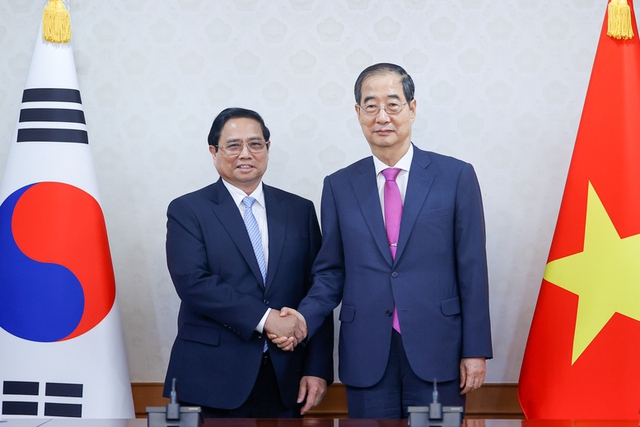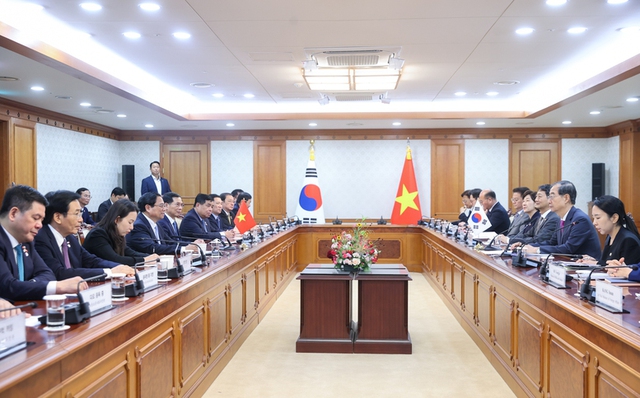Viet Nam, South Korea vow to realize trade goal of US$100 bln next year
VGP - Prime Minister Pham Minh Chinh and his South Korean counterpart Han Duck-soo agreed to realize the goal of raising the bilateral trade value to US$100 billion by 2025 and US$150 billion by 2030 in a more balanced and sustainable manner.

Prime Minister Pham Minh Chinh (L) holds talks with his South Korean counterpart Han Duck Soo, Seoul, South Korea, July 2, 2024 - Photo: VGP
The agreement was reached during their summit meeting in Seoul on July 2 on the occasion of the Vietnamese leader's official visit to the Northeast Asian nation from June 30-July 3.
Pham reiterated that Viet Nam advocates South Korea's policies and development goals, including the South Korea's vision as a 'global pivotal state', expressing his wish to develop the comprehensive strategic partnership between the two countries in a substantive, effective and long-term fashion.
He hailed achievements in the bilateral ties since the two nations upgraded their relations to a comprehensive strategic partnership in 2022, remarkably in terms of political trust, trade, investment, tourism, people-to-people exchanges, science and technology cooperation, labor, local-to-local cooperation, and cooperation in regional and international issues.
Pham proposed South Korea continue to make it easier for Viet Nam's advantaged goods such as processed foods, agricultural and aquatic products, and seasonal fruits to enter the Korean market.
He called on Korean businesses to expand investment in Viet Nam, especially in the fields of gas-fired power, digital economy, green economy, circular economy, semiconductor chips, renewable energy, technology biotechnology, artificial intelligence (AI) and build more R&D centers in Viet Nam.
Pham suggested the Korean Government support the early opening of the Vietnamese Consulate General in Busan city in 2024 and establish the Vietnamese Cultural Center in South Korea.
He urged South Korea to simplify visa procedures and move towards visa exemption for Vietnamese citizens entering South Korea, contributing to promoting tourism cooperation between the two countries.
The guest underlined the need to strengthen local-to-local exchanges; organize "Meet Korea" conference in Vietnamese localities; and provide more scholarships for Vietnamese students to study in South Korea.
Pham asserted that Viet Nam consistently supports denuclearization, and promotes dialogue, peace, stability, cooperation and development on the Korean Peninsula.

Prime Minister Pham Minh Chinh holds talks with his South Korean counterpart Han Duck Soo, Seoul, South Korea, July 2, 2024 - Photo: VGP
Han Duck-soo, for his part, said that Viet Nam is a key partner in South Korea's policy towards the region, including the Indo-Pacific Strategy and the Korea-ASEAN Solidarity Initiative (KASI).
He affirmed that South Korea will support Vietnamese businesses to participate more deeply in the supply chain led by Korean businesses in Viet Nam, suggesting the two sides facilitate Korean businesses to invest in building stable core mineral supply chains in Viet Nam.
Emphasizing that South Korea continues to consider Viet Nam an important strategic partner in its development cooperation, the host said that South Korea prioritizes supporting Viet Nam in training human resources via non-refundable development aid through the Korea International Cooperation Agency (KOICA).
He committed to further expanding the scale of non-refundable aid to areas such as public administration development, e-Government, education, and R&D.
South Korea will continue to increase the quota for receiving Vietnamese workers and support the second phase of the Viet Nam-Korea Institute of Science and Technology (VKIST) project, underlined the South Korean Prime Minister.
He said that he will attend the Partnering for Green Growth and the Global Goals 2030 (P4G) Summit in Viet Nam in April 2025, adding that South Korea will support Viet Nam to successfully organize the event.
Both sides pledged to work closely to promote delegation exchanges and contacts at all levels and via all channels and enhance people-to-people exchanges to increase political trust and mutual understanding, thus creating a foundation to promote and expand bilateral cooperation in all fields.
They agreed to direct ministries and agencies to speed up the opening of market for Vietnamese grapefruit and Korean melons in 2024.
Comparing notes on regional and international issues of mutual concern, the pair agreed to bolster close coordination at regional and international multilateral mechanisms such as the United Nations and ASEAN.
The two leaders shared a common vision of ensuring security, safety, and freedom of navigation and aviation in the East Sea; voicing their strong support for resolving disputes by peaceful means, in accordance with international law, including the 1982 United Nations Convention on the Law of the Sea (UNCLOS 1982).
After the talks, they witnessed the signing of nine cooperation documents in terms of economy, trade, investment, development cooperation, exchange of startup ecosystems, competition and consumer protection./.

